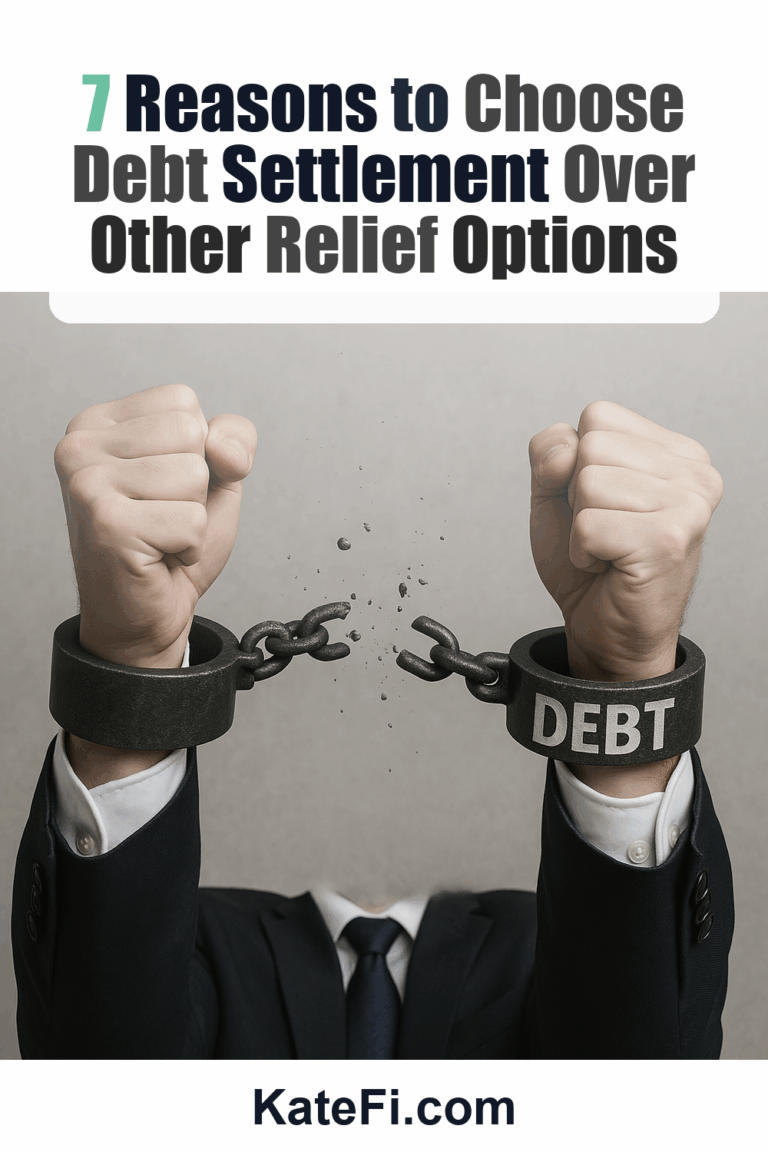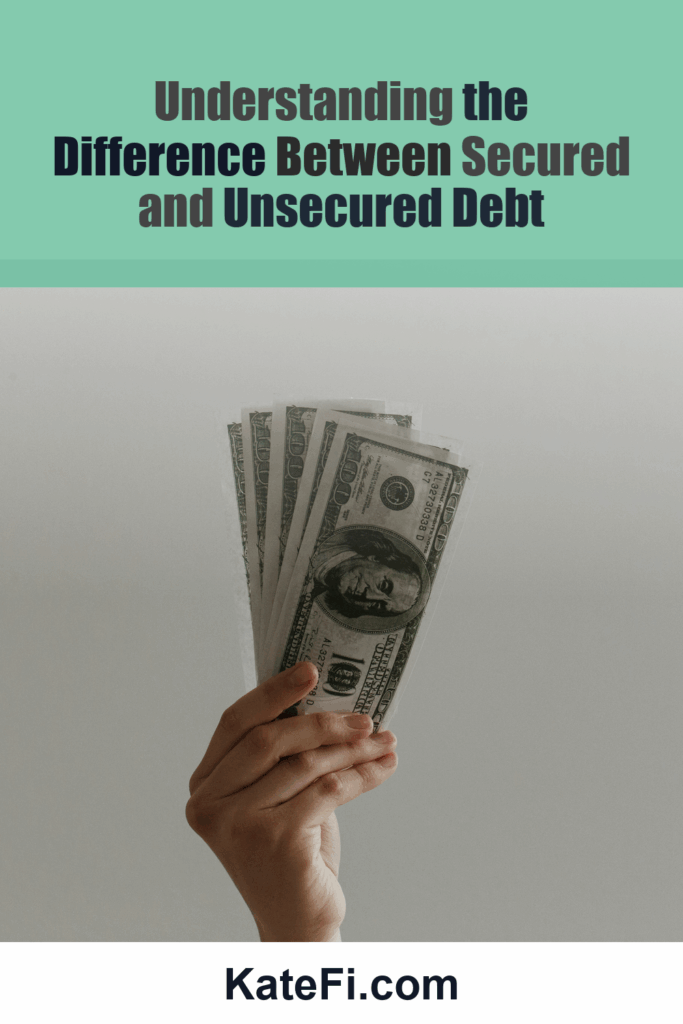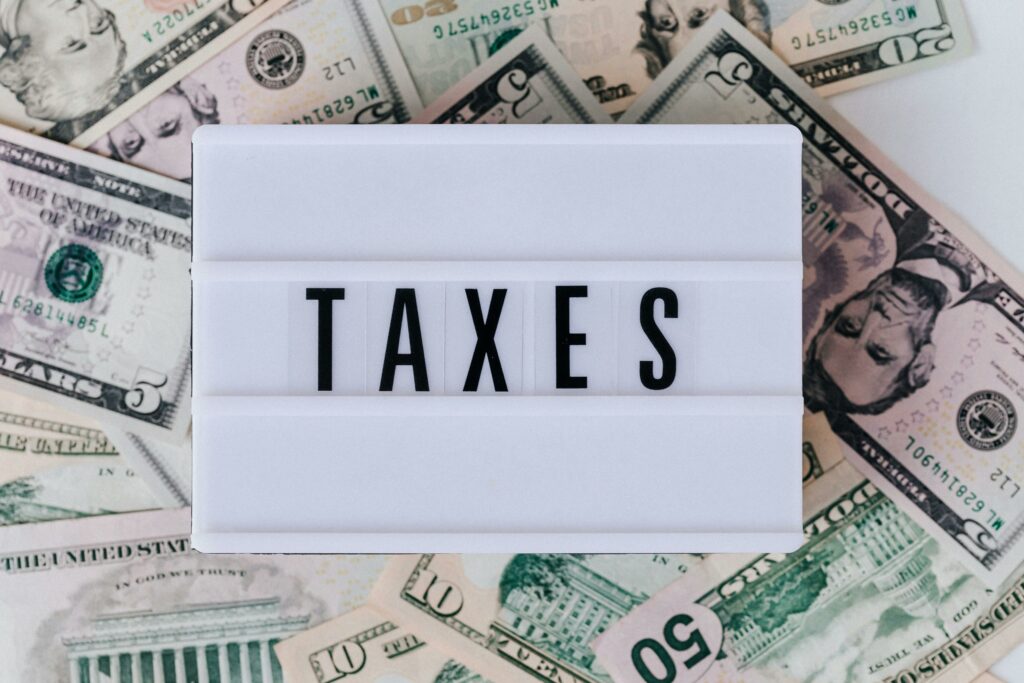7 Reasons to Choose Debt Settlement Over Other Relief Options
Navigating the stormy waters of debt can feel overwhelming. Whether you’re grappling with credit card balances, medical bills, or personal loans, finding a path to financial freedom often seems daunting. At KateFi, we know that understanding your options is essential. While there are numerous debt relief solutions available, debt settlement is an approach worth serious consideration.
Love our content? Show your support by following us — pretty please!🥺
FOLLOW ON PINTEREST
Hi! I’m Kate, the face behind KateFi.com—a blog all about making life easier and more affordable.
To illustrate why, let’s look at the case of Sarah, a single mother struggling with over $30,000 in credit card debt. After facing unexpected medical expenses and job loss, her financial situation spiraled out of control. As Sarah explored her options, she discovered debt settlement and how it could provide a lifeline. Below are seven compelling reasons why debt settlement can be the right choice for those in similar circumstances.
1. Significant Savings on Total Debt
Lower Your Unsecured Debt
If you have $5,000+ in credit card or personal loan debt, a free consult can review options like settlement or hardship plans.
- One-on-one call to review your debts and goals
- See potential monthly payment reductions
- No obligation to enroll
Not available in IL, KS, OR, TN, UT, WV.
One of the most enticing aspects of debt settlement is the potential for substantial savings. Unlike other options, where you may end up paying the full amount owed, debt settlement allows you to negotiate with creditors for a reduced balance.
For example, Sarah managed to settle her debt for about 50% of the original amount owed. This not only relieved her of financial pressure but also freed up funds to cover essential living expenses.
To maximize your savings, it’s essential to have a solid negotiation strategy in place. Working with a knowledgeable counselor can help you develop effective tactics tailored to your situation.
✅ See If You Qualify for Debt Relief
2. Reduced Monthly Payments
Unlike traditional repayment plans that may stretch over several years, debt settlement often results in significantly lower monthly payments. This can be particularly beneficial for individuals facing temporary financial hardships, like Sarah.
By settling her debts, Sarah was able to negotiate payments that fit within her current budget, allowing her to focus on rebuilding her life without the burden of excessive financial stress.
As you consider debt settlement, think about how it can ease your monthly cash flow. Be prepared to discuss your financial situation with a counselor and consider what payment plan might work best for you.
3. Faster Debt Resolution
What You’ll Learn on the Call
- Estimated timeline and monthly payment range
- How credit may be affected in the short term
- What documents to gather to move faster
Not available in IL, KS, OR, TN, UT, WV.
While traditional debt repayment plans can last several years, debt settlement typically allows for quicker resolution. In Sarah’s case, she was able to settle her debts within just 18 months, compared to the five to seven years she faced with a standard repayment plan.
This expedited process not only provided Sarah with peace of mind but also allowed her to redirect her focus toward future financial goals sooner rather than later. The quicker you resolve your debts, the sooner you can begin rebuilding your financial future.
✅ See If You Qualify for Debt Relief
4. Less Impact on Credit Compared to Bankruptcy
Understand pros/cons of settlement vs consolidation vs DMP for your exact mix of debts.
Not available in IL, KS, OR, TN, UT, WV.
While any debt relief option can affect your credit score, debt settlement can be less detrimental than declaring bankruptcy. Sarah was concerned about her credit score, but through diligent negotiations and timely payments, she was able to minimize the long-term damage.
It’s important to remember that the impact on credit can vary depending on individual circumstances. You should be prepared to discuss potential credit implications with your counselor. Having a clear understanding of how different options may affect your credit score will help you make informed decisions.
5. No Upfront Fees
👉 Start Your Free Debt Relief Review
Not available in IL, KS, OR, TN, UT, WV.
Many debt relief options, including consolidation loans, may require upfront fees or collateral. Debt settlement typically operates on a contingency basis, meaning that you only pay when your debts are successfully settled. This was a key factor for Sarah, who needed to manage her limited finances wisely.
While fees may apply if you enroll in a program, it’s essential to clarify any costs upfront. During your free consultation with a debt relief counselor, ask about potential fees and payment structures. Transparency is vital when selecting the best option for your situation.
✅ See If You Qualify for Debt Relief
6. Personalization to Fit Your Situation
Debt settlement isn’t a one-size-fits-all solution; it can be tailored to meet your unique financial circumstances. Sarah’s situation was quite different from that of others, and her debt settlement counselor helped her devise a personalized plan that addressed her specific needs.
When considering debt settlement, think about your financial goals, timeline, and comfort level with negotiation. A qualified debt relief counselor can assist you in navigating these factors effectively, ensuring that your settlement plan is designed specifically for you.
7. Documentation of Hardship Strengthens Your Case
A critical element in successful debt settlement is the ability to document your financial hardship convincingly. Sarah gathered her financial statements, proof of income loss, and medical bills to substantiate her claims. This documentation not only provided a clear picture of her situation but also enhanced her bargaining position with creditors.
When preparing for a debt settlement, gather the following documents to present a strong case:
- Financial statements (bank statements, income verification)
- Proof of any income loss or unexpected expenses (medical bills, layoff notices)
- A budget outlining your monthly expenses
Discussing these documents with your debt counselor will help you navigate negotiations with confidence.
✅ See If You Qualify for Debt Relief
Checklist for Your Debt Settlement Journey
To ensure you are adequately prepared for your debt settlement process, here’s a handy checklist:
- Gather Necessary Documents:
- Financial statements
- Proof of income loss
- Any relevant bills or notices
- Create a Budget:
- Outline monthly expenses
- Determine what payments you can afford
- Research Debt Relief Counselors:
- Check credentials
- Look for reviews or testimonials
- Prepare Questions:
- Inquire about fees and program specifics
- Ask about potential credit impact
- Establish Your Goals:
- Determine what you hope to achieve through settlement
- Clarify your timeline and expectations
By following this checklist, you will feel more organized and ready to tackle your debt settlement journey head-on.
Conclusion
For individuals like Sarah, who are grappling with overwhelming debt, debt settlement can provide a practical and effective way to regain control over their financial lives. By focusing on negotiation tactics and documenting your hardships, you can create a compelling case for creditors, paving the way for substantial savings and quicker resolutions.
If you’re feeling the weight of financial stress and wondering whether debt settlement is right for you, don’t hesitate to reach out. Getting a clear understanding of your options starts with a free consultation. Connect with a debt relief expert today to explore how debt settlement might help you move forward.
Important: This content is for education only—not legal, tax, or financial advice. Results and eligible programs vary by situation and state. Fees apply if you enroll and complete a program. Debt relief can affect credit; missed payments may lead to collections/lawsuits. Not available in IL, KS, OR, TN, UT, WV.






















